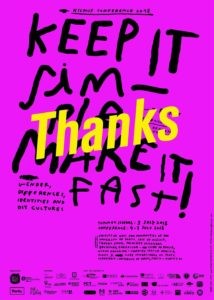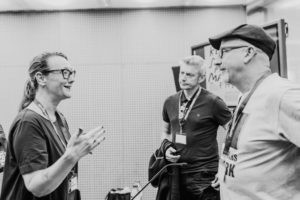
KISMIF 2018 Conference Report
In 2015 I attended the first Keep It Simple Make It Fast (KISMIF) conference in Porto.
It was at the early stages of my PhD and was a very supportive environment in which to present my outlying ideas and concepts that would make up the structure of my PhD. I got some very useful feedback and suggestions regarding my work which certainly fed into the future development of my argument sand sub arguments.

4 years later I have returned to KISMIF again, for 4 days of intense but very interesting presentations from scholars around the world, and also returned to the very fine city of Porto and the Universidad `de Lettres where the conference has always taken place. As I expected, the conference has maintained its dynamic edge and presented a wide variation of work focussed around DiY/underground subcultures and scenes, this time with a focus on gender and identity. Work encompassed just about every conceivable music genre (did you know that Lo-Fi Forest Black Metal is a thing in Tasmania and the extreme southern regions of the antipodes? -trust me it is). It also encompassed genders of sexuality, mental health, communities. The purpose of a conference report such as this is to discuss the highlights of the conference and I could go on for pages as there was so much to discuss-so please do check out the conference programme online to see the vast array of subject matters covered in the conference-along with some great plenary lectures, gigs and book launches.
This time around I presented work on my penultimate chapter of my PhD as I draw towards the end of what has seemed like a very long and demanding journey. My chapter sat within the identity strand of the conference and was attempting to address the lack of literature and investigation into why people disassociate themselves (exit) from subcultures and scenes and in my case specifically from punk subcultures and scenes. My thoughts on the lack of literature are that firstly, academics who study subcultures/scenes have no interest in those that leave as they are more interested in. studying what goes on IN subcultures and scenes. My other rationale/claim is that there hasn’t been a conceptual framework in popular music studies for investigating why people exit from musical subcultures and scenes.
In my presentation I draw on the work of Rose Ebaugh, who has studied why and how people exit from their ‘roles’ and their role identities. I also draw on the work of Alistair Gordon, who conducted an ethnography in to the Bradford and Leeds DiY punk scenes and as to the reasons why some people exited from those scenes. Whilst their work is illuminating and useful it requires some adaptation to fit into my particular investigation. I am therefore in the process of trying to develop a conceptual framework, based around theory work, for this type of investigation, as my contribution to new knowledge =within popular music studies. My paper and slides are attached to this blog post so you can get the full detail of my ongoing discussion and developments.
One of the issues that has always irritated me about KISMIF are the many parallel panels (of which I don’t really approve) and the number of speakers on each panel (5-6), which left time for each presenter to field one question from the audience. If I had flown 38 hours to present a 15-minute presentation and was only given the opportunity to field one question about my work I would n=be a bit miffed. Fortunately, I was on the first set of panels of the day on the first day and had the pleasure of presenting alongside 2 fellow punk scholars Lucy Robinson, from Sussex University and Pete Webb from UWE, Bristol.

The other 2 academics due to speak on our panel did not show, so fortunately we had plenty of time for questions afterwards, and boy were they useful. I ended up getting into a really useful and insightful debate with Geoff Stahl, one of the leading academics in subcultural and post subcultural studies, about my use of the mixed terms, subculture and scene, in my presentation. This discussion/argument between sub-culturalists and post-subculturalists has been going on for over 20 years, and in my mind is a way of academics attempting to label particular groups of people and pigeonhole them as a way of the academics being able to study them. My rationale for using both those terms in my work is that my participants demonstrate both subcultural practices and scene practices. Also, the period of time that my participants were involved in anarcho-punk, it (anarcho-punk) was understood as a subculture and pre-dated post subcultural studies. However, as I am drawing on present notions of the use of memory and nostalgia in recounting narratives of the past in the present, a number of post-subcultural frameworks seem to resonate too.
I suggested to Geoff Stahl that I could not reconcile the divide within subcultural and post-subcultural research/studies in my own work, and had no interest to do so, as I felt that it has over time become less relevant. However, my alternative approach to this ongoing issue was to give more agency to the people involved in those subcultures /scenes and draw on their lived experience and use their common parlance as to how they referred to themselves. Let their voices speak rather than the voices of academia ‘labelling’ them as one thing or the other, something perhaps missing from subcultural/post-subcultural studies. In terms of my own study my research participants discussed anarcho-punk, and their involvement in anarcho-punk, in terms of a scene, a subculture and a movement. Does this then still leave the whole subcultural/post-subcultural debate hanging, from the perspective of academia? The discussion will no doubt continue to be contested. The whole subculture/scene/movement label is a debate I have wrestled with in my PhD for many years, and after being confronted about this but Geoff Stahl, my unrehearsed defence of my use of those terms mixed suddenly brought a number of issues and conceptual debates into focus. I think I might be getting somewhere. Well worth the 4 days amongst an amazing community of academics and scholars.
